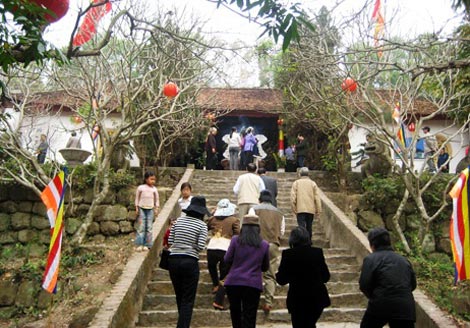Thousands of visitors flocked to the Phat Tich Pagoda in the northern province of Bac Ninh for its annual peony festival, held on February 22 (the fourth day of the first lunar month).

The Phat Tich pagoda, a special national relic site located just 25 kilometres northeast of Ha Noi, was built in 1057 on a mountain called Lan Kha during the reign of King Ly Thanh Tong (1054-1072). It was reduced to ashes by French colonialists in 1948 and restored in 1987.
During the excavation of the pagoda from 1949-1951, archaeologists found numerous old stone sculptures carved with flowers and dragons, bird goddess statues from the 17th century, and a piece engraved with the head of a fairy, all of which are now on display at the National History Museum.
A giant Buddha Amitabha statue, 27 metres tall and weighing 3,000 tonnes, was installed outside on the Lan Kha Mountain in 2010. It was adapted from a similar structure from the Ly Dynasty.
The Phat Tich Pagoda is associated with Tu Thuc’s meeting with a fairy. As the legend goes, there were endless peonies on Lan Kha Mountain and in the pagoda, leading a young woman to visit the pagoda one day to see the flowers. She carelessly broke a tree branch and was fined by the monks, but a local scholar, Tu Thuc, was also visiting the pagoda and offered his coat to compensate for the broken branch. They became friends and continued to meet at the pagoda. The woman ultimately invited Tu Thuc to visit her house, leading him to a peony forest and into a cave on the mountainside with an imperial palace with high walls and stone footsteps. She revealed that she was a fairy and they got married.
Every year, people visit the pagoda to take part in the peony festival, where they enjoy looking at the flowers, listening to quan ho (love duets) and poem recitations, and playing traditional games. The festival usually lasts three days.
The same day, thousands of international and domestic tourists gathered for the Dong Ky Firecrackers Festival in Tu Son Town to enjoy the two giant symbolic firecrackers and the annual procession.
They also joined in traditional games and enjoyed art performances during the event.
Although the Government banned firecrackers in 1995, the locality has preserved and upheld the tradition symbolically to ensure its continuity.